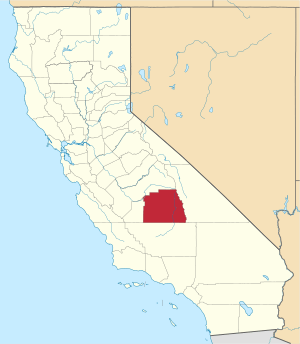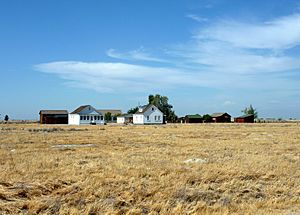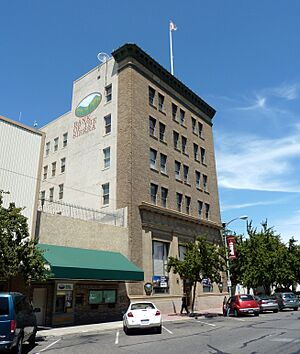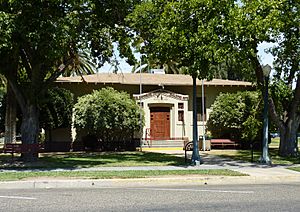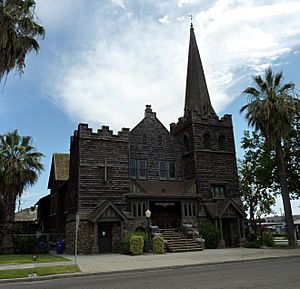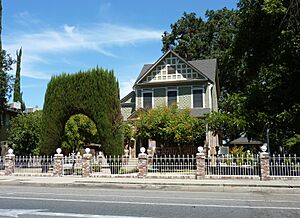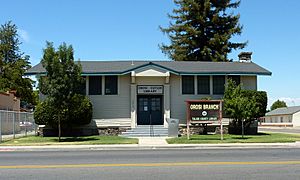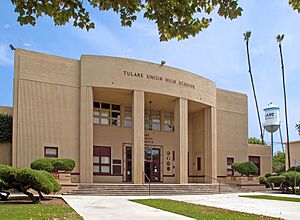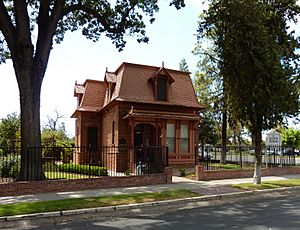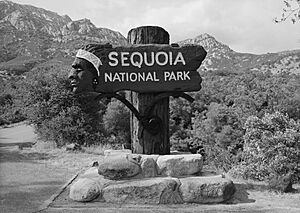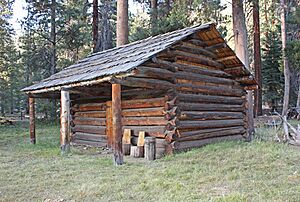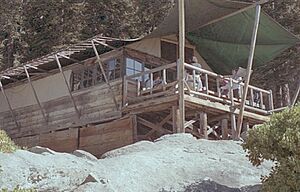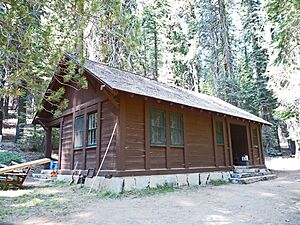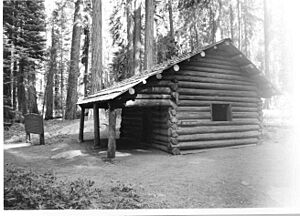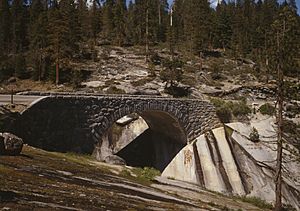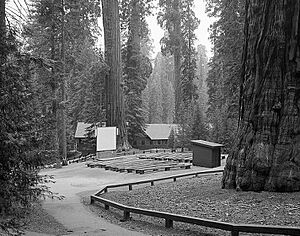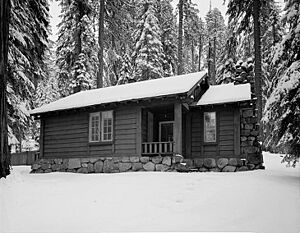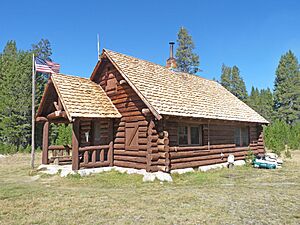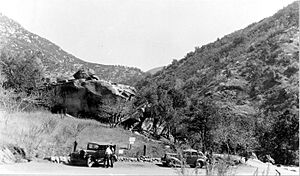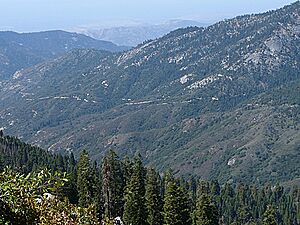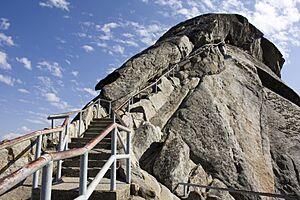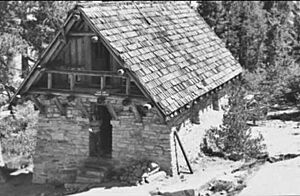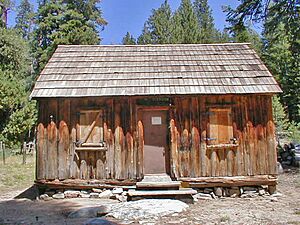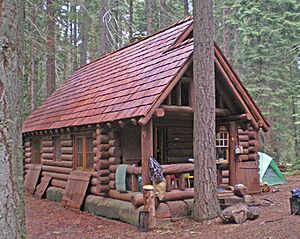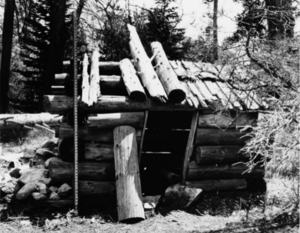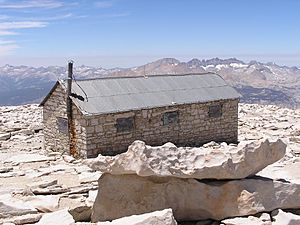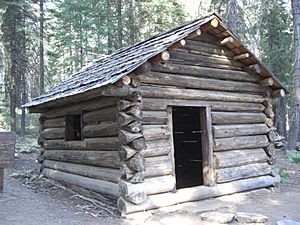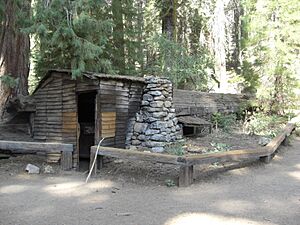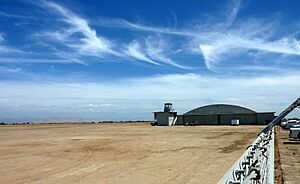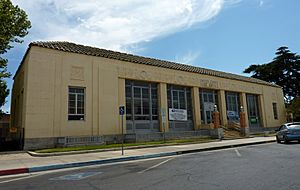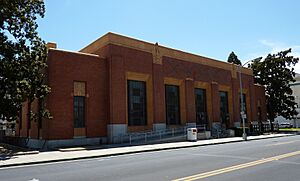National Register of Historic Places listings in Tulare County, California facts for kids
Did you know that many special places in Tulare County, California, are officially recognized for their history? These places are listed on the National Register of Historic Places. It's like a special list kept by the United States government. It helps protect buildings, areas, and objects that are important to our country's past.
When a place is on this list, it means it has a unique story to tell. It could be an old house, a special park, or even a bridge! Tulare County has 36 of these amazing historic spots. Let's explore some of them and learn about their cool stories!
Contents
- Historic Places in Tulare County
- Buildings and Homes with Stories
- Nature's Historic Spots in Sequoia National Park
- Ash Mountain Entrance Sign
- Barton-Lackey Cabin
- Bearpaw High Sierra Camp
- Cabin Creek Ranger Residence and Dormitory
- Cattle Cabin
- Generals' Highway Stone Bridges
- Giant Forest Lodge Historic District
- Giant Forest Village-Camp Kaweah Historic District
- Hockett Meadow Ranger Station
- Hospital Rock
- Mineral King Road Cultural Landscape
- Moro Rock Stairway
- Pear Lake Ski Hut
- Quinn Ranger Station
- Redwood Meadow Ranger Station
- Shorty Lovelace Historic District
- Smithsonian Institution Shelter
- Squatter's Cabin
- Tharp's Log
- Other Interesting Historic Sites
- Images for kids
Historic Places in Tulare County
Buildings and Homes with Stories
Many buildings in Tulare County have been around for a long time and have seen many changes. They are like time capsules!
Allensworth Historic District
The Allensworth Historic District is a very special place. It was the first town in California founded, financed, and governed by African Americans. Colonel Allen Allensworth, a former slave and army chaplain, started this community in 1908. It was a place where African Americans could live and work freely. Today, it's a state historic park where you can learn about its amazing history.
Bank of Italy Building
In Visalia, you can find the old Bank of Italy Building. It was built in 1922 and has a grand design. The Bank of Italy was a very important bank that later became Bank of America. This building shows how important banks were to the growth of towns like Visalia many years ago.
Exeter Public Library
The Exeter Public Library was built in 1916. It's a beautiful building that was partly funded by Andrew Carnegie, a famous businessman who helped build many libraries across the country. Libraries are important places where people can learn and read. This building has served the community for over 100 years!
First Congregational Church
The First Congregational Church in Porterville is another historic building. It was built in 1910 and has a unique architectural style. Churches often play a big role in a community's history, serving as places for worship and gathering.
Hyde House
The Hyde House in Visalia is a lovely old home. It was built in 1879 and shows the style of homes from that time. Learning about old houses helps us understand how people lived in the past.
Orosi Branch Library
Just like the Exeter library, the Orosi Branch Library is also on the historic register. Built in 1921, it's another example of a Carnegie library. These libraries were designed to be welcoming and grand, encouraging everyone to read and learn.
Tulare Union High School Auditorium and Administration Building
The auditorium and administration building at Tulare Union High School are historic. Built in 1937, they are great examples of school architecture from that period. Schools are central to a community, and these buildings have seen many generations of students pass through their doors.
Zalud House
The Zalud House in Porterville was built in 1891. It's a well-preserved Victorian-style home. It gives us a peek into the lives of families who lived in Tulare County over a century ago.
Nature's Historic Spots in Sequoia National Park
Many historic places in Tulare County are found within the beautiful Sequoia National Park. These spots often relate to how people explored and managed these wild lands.
Ash Mountain Entrance Sign
The Ash Mountain Entrance Sign is the main entrance to Sequoia National Park near Three Rivers. This sign, built in 1935, welcomes visitors and is a historic marker for the park. It's often the first thing people see when they enter this amazing natural area.
Barton-Lackey Cabin
The Barton-Lackey Cabin is a rustic cabin located north of Mineral King. It was built in 1890 and shows how early settlers and explorers lived in the rugged mountain areas. It's a reminder of the tough conditions people faced when settling these lands.
Bearpaw High Sierra Camp
The Bearpaw High Sierra Camp is a special place for hikers. It's located along the High Sierra Trail in Sequoia National Park. This camp, established in 1934, offers a place for people to rest and enjoy the wilderness. It's a historic example of how parks made nature accessible to visitors.
Cabin Creek Ranger Residence and Dormitory
Near Wilsonia, you'll find the Cabin Creek Ranger Residence and Dormitory. Built in 1935, these buildings were homes for park rangers. Rangers are important for protecting the park and helping visitors. These historic buildings show the early efforts to manage and preserve national parks.
Cattle Cabin
The Cattle Cabin, built in 1918, is located northeast of Three Rivers in Sequoia National Park. It was used by cattle ranchers who grazed their animals in the mountains. This cabin tells a story about the history of ranching in the area before it became a fully protected national park.
Generals' Highway Stone Bridges
The Generals' Highway is a famous road in Sequoia National Park. It has several beautiful stone bridges that were built in the 1930s. These bridges are historic because they show amazing craftsmanship and how roads were built to blend into the natural landscape. They helped people explore the giant sequoia trees.
Giant Forest Lodge Historic District
The Giant Forest Lodge Historic District is a group of buildings in the heart of Sequoia National Park. Built in the 1920s and 1930s, this area provided lodging and services for early park visitors. It helped make the park a popular destination for people wanting to see the huge sequoia trees.
Giant Forest Village-Camp Kaweah Historic District
Also in Sequoia National Park, the Giant Forest Village-Camp Kaweah Historic District includes more buildings and areas used by visitors and park staff. These places, developed in the 1920s, helped people enjoy the park while also protecting its natural beauty.
Hockett Meadow Ranger Station
The Hockett Meadow Ranger Station, built in 1935, is south of Silver City in Sequoia National Park. This station was used by rangers to patrol and protect the remote parts of the park. It's a reminder of the hard work involved in preserving wilderness areas.
Hospital Rock
Hospital Rock is a large rock formation near Three Rivers. It's important because it has ancient Native American pictographs (rock paintings). It was also a stopping point for early explorers and settlers. It tells stories of thousands of years of human history in the area.
Mineral King Road Cultural Landscape
The Mineral King Road is a winding road that leads into the high mountains of Sequoia National Park. This "cultural landscape" is historic because it shows how people interacted with and shaped the mountain environment over time, from mining to recreation.
Moro Rock Stairway
The Moro Rock Stairway is an amazing set of stairs built into the side of a giant granite dome called Moro Rock. Built in 1931, this stairway allows visitors to climb to the top for incredible views of the park. It's a great example of how parks made natural wonders accessible while protecting them.
Pear Lake Ski Hut
The Pear Lake Ski Hut, built in 1941, is a shelter for skiers and hikers in the winter. Located in a remote part of Sequoia National Park, it provides a safe place for adventurers. It shows the history of winter sports and recreation in the park.
Quinn Ranger Station
The Quinn Ranger Station, built in 1935, is another historic ranger station in Sequoia National Park. These stations were crucial for park operations, allowing rangers to live and work deep within the wilderness.
Redwood Meadow Ranger Station
The Redwood Meadow Ranger Station, built in 1935, is northeast of Three Rivers in Sequoia National Park. Like other ranger stations, it played a vital role in managing and protecting the park's vast forests and wildlife.
Shorty Lovelace Historic District
The Shorty Lovelace Historic District is east of Pinehurst in Kings Canyon National Park. It includes a cabin built in 1920 by a colorful character named Shorty Lovelace. It represents the lives of independent mountain residents.
Smithsonian Institution Shelter
The Smithsonian Institution Shelter, built in 1909, is west of Lone Pine in Sequoia National Park. This shelter was used by scientists from the Smithsonian Institution who were studying the high Sierra Nevada mountains. It highlights the history of scientific research in the park.
Squatter's Cabin
The Squatter's Cabin, built in 1884, is northeast of Three Rivers. It's a very old cabin that shows how some of the earliest settlers lived in the area, sometimes without official land claims.
Tharp's Log
Tharp's Log is a unique historic site northeast of Three Rivers. It's a giant hollowed-out sequoia log that was used as a cabin by Hale Tharp, one of the first non-Native American settlers in the Giant Forest. It's a fascinating example of early pioneer life.
Other Interesting Historic Sites
Tulare County has other unique places that tell different parts of its history.
Sequoia Field- Visalia-Dinuba School of Aeronautics
Sequoia Field was an important place for aviation history. Near Visalia, it was home to the Visalia-Dinuba School of Aeronautics. During World War II, many pilots were trained here. It shows how Tulare County played a part in national defense.
US Post Office-Porterville Main
The main Post Office in Porterville, built in 1937, is also on the historic register. Post offices were, and still are, very important for communication and connecting communities. This building has served the people of Porterville for many decades.
US Post Office-Visalia Town Center Station
Similarly, the Visalia Town Center Station Post Office, built in 1933, is a historic site. Its architecture often reflects the time it was built, and these buildings are important landmarks in their towns.
Wilsonia Historic District
The Wilsonia Historic District is a community within Sequoia National Park. It's a collection of cabins and buildings that show the history of private land ownership and development within a national park. It's a unique example of how people lived and vacationed in this special natural setting.
These are just some of the many fascinating places on the National Register of Historic Places in Tulare County. Each one helps us understand the rich and diverse history of this part of California!
Images for kids
-
2009-0725-CA-Springville-ElsterBuilding.jpg
C. A. Elster Building
-
Pogue Hotel Lemon Cove.jpg
Pogue Hotel
-
The Pioneer Visalia.jpg
The Pioneer


